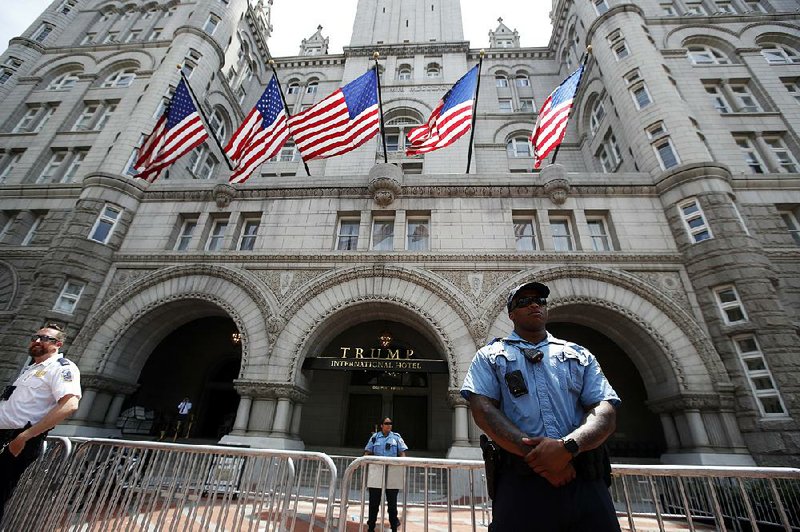A federal judge on Friday gave the go-ahead to a lawsuit filed by 200 congressional Democrats against President Donald Trump alleging he has violated the Constitution by doing business with foreign governments while in office.
The lawsuit is based on the Constitution's emoluments clause, which bars presidents from taking payments from foreign states. Trump's business, which he still owns, has hosted foreign embassy events and visiting foreign officials at its downtown District of Columbia hotel.
The decision opens up yet another legal front for the president, who is now facing an array of inquiries into his business, his campaign and his charity.
Trump is already facing a separate emoluments suit filed by the attorneys general of Washington, D.C., and Maryland that is moving forward. In addition, he is contending with the ongoing special counsel investigation into Russian interference, a lawsuit from the New York attorney general that alleged "persistently illegal conduct" at his charitable foundation, and a lawsuit brought by former Apprentice contestant Summer Zervos, who accused Trump of groping her and is seeking damages on the grounds that he defamed her when he dismissed her account as untruthful.
In his ruling, Judge Emmet Sullivan wrote that the members of Congress "appropriately seek relief in federal court" because they have no way to address their concern about Trump's alleged violation of the emoluments clause with legislation.
"The Clause requires the President to ask Congress before accepting a prohibited foreign emolument," Sullivan wrote. If the allegations made by Democrats are true, he said, then "the President is accepting prohibited foreign emoluments without asking and without receiving a favorable reply from Congress."
By not asking Congress, Sullivan said, Trump could have effectively "nullified their votes" -- which, he said, meant legislators could seek the unusual remedy of filing a lawsuit against the president.
Although Trump has given up day-to-day management of his businesses, which include residential, office, hotel and golf properties in the United States, Europe and South America, he still owns them and can withdraw money from them at any time.
The foreign emoluments clause prohibits payments from foreign governments, which it says cannot be accepted "without the consent of Congress."
Some of Trump's properties benefit from investments or business from foreign governments, particularly his Washington, D.C. hotel, which has hosted leaders from Kuwait, Malaysia and other countries.
The president has not asked Congress to approve any transactions with foreign states.
Trump's attorneys have argued this is not necessary, because the payments he receives through the hotel and other businesses are not emoluments -- at least, not by the definition the Founding Fathers would have used.
At the end of the last fiscal year, the Trump Organization said it donated $151,470 in February in what it said were profits from foreign government business, but declined to explain how it determined that amount.
The congressional plaintiffs, led by Sen. Richard Blumenthal, D-Conn., and Rep. Jerrold Nadler, D-N.Y., asked the court to force Trump to stop accepting payments they consider improper -- or to force him to seek Congress' consent first.
Justice Department attorneys, who are representing Trump, asked the court to dismiss the case. They said Congress does not need to wait for Trump to ask permission -- it could act first and pass a bill to ban the president from accepting such compensation.
In the other emoluments suit, the State of Maryland and the District of Columbia contend Trump's financial interests -- particularly his Washington, D.C. hotel -- allow him to unfairly profit. Justice Department lawyers in that case say the president is not breaking the law when foreign officials book rooms at his hotel in the capital because he is not trading favors in exchange for a benefit.
Last month, Justice Department attorneys in that case asked a federal judge to halt proceedings, arguing that allowing the case to go forward would "be a distraction to the President's performance of his constitutional duties." This sort of appeal is rarely granted, because lower court judges usually prefer to complete a full case before any appeal is made.
A third emoluments case, brought by the advocacy group Citizens for Responsibility and Ethics in Washington, was dismissed for lack of standing but is under appeal.
Before Trump took office, the emoluments clauses of the Constitution had not been tested in court in more than 200 years. One clause bars federal officers from taking gifts, or emoluments, from foreign governments. The other prohibits presidents from taking side payments from individual states.
Both aim to ensure independence and guard against undue influence by other governments.
A Section on 09/29/2018

